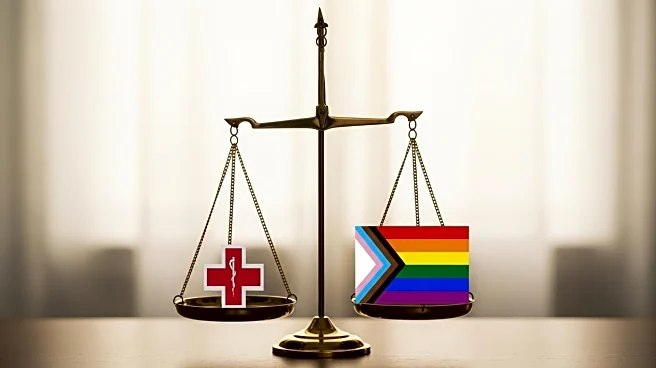What is the story about?
What's Happening?
A federal appeals court has ruled that Houston County, Georgia, did not violate Title VII of the Civil Rights Act by excluding coverage for gender-affirming surgeries in its insurance plan. The 11th U.S. Circuit Court of Appeals issued an en banc opinion stating that the county's policy does not discriminate based on a protected characteristic, reversing a previous district court decision. The case, Lange v. Houston County, Georgia, involved a transgender employee of the Houston County Sheriff's Office who was denied coverage for gender-affirming care. The appeals court determined that the exclusion is based on medical use rather than transgender status, citing a Supreme Court case, U.S. v. Skrmetti, which upheld similar exclusions under Tennessee law.
Why It's Important?
This ruling has significant implications for insurance coverage policies regarding gender-affirming care across the United States. By upholding the exclusion, the court sets a precedent that could influence other jurisdictions considering similar policies. The decision highlights ongoing legal debates about the scope of Title VII protections concerning gender identity and medical treatment. Stakeholders such as transgender rights advocates may view this as a setback in efforts to ensure comprehensive healthcare coverage for transgender individuals. Conversely, entities supporting the exclusion may argue it aligns with existing legal frameworks and medical classifications.
What's Next?
The ruling may prompt further legal challenges and discussions about insurance coverage for gender-affirming care. Advocacy groups might seek to appeal the decision or push for legislative changes to ensure broader healthcare access for transgender individuals. Additionally, other counties and states may reevaluate their insurance policies in light of this ruling, potentially leading to a patchwork of coverage standards across the country. The decision could also influence future court cases addressing similar issues, shaping the legal landscape regarding healthcare rights for transgender people.
Beyond the Headlines
The decision raises ethical questions about the balance between legal interpretations and the healthcare needs of marginalized communities. It underscores the complexities of defining discrimination in insurance policies and the potential impact on individuals seeking gender-affirming care. Long-term, this ruling may affect societal perceptions of transgender rights and healthcare equity, influencing public policy and cultural attitudes towards gender identity and medical treatment.
















